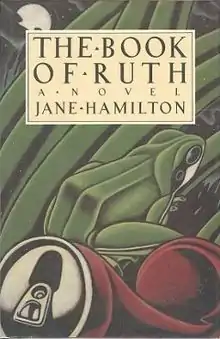The Book of Ruth (novel)
The Book of Ruth (1988) is a novel by Jane Hamilton. It won the Hemingway Foundation/PEN Award for a best first novel in 1988 and was the Oprah's Book Club selection for November 1996.
 First edition | |
| Author | Jane Hamilton |
|---|---|
| Country | United States |
| Language | English |
| Published | 1988 (Ticknor and Fields) |
| Media type | Print (hardback & paperback) |
| Pages | 328 pp |
| ISBN | 0-89919-744-2 |
| OCLC | 17919102 |
| 813/.54 19 | |
| LC Class | PS3558.A4428 B66 1988 |
Plot summary
An awkward midwest girl, Ruth, is growing up in the small town of Honey Creek, Illinois. Her father, Elmer, left her family when she was ten, which left her mother, May, very bitter. May is extremely unhappy with and disappointed in Ruth because she is nothing like her shining brother, Matt, who is a mathematical genius with a scholarship to MIT, while Ruth is considered remedial. Their mother May is crushed when Matt moves away to Boston after graduation and she is left with Ruth, who takes a job with her at the local dry cleaner shop.
Ruth's one confidant is her mother's sister, and Aunt, who is worldly and kind, and recognizes that Ruth is a sensitive observant young woman trapped in the circumstances of her economic and social status. The Aunt continues a relationship with both Ruth and Matt over the years, and provides Ruth with a glimpse into what life could be like as an independent middle class woman.
One hot night at the local lake, Ruth meets Ruby Dahl, a local male ne'er do well. When Ruby later takes Ruth out on a date, he takes advantage of her naiveté, but Ruth continues to see him and after several dates they decide to get married. Ruby moves in with Ruth and May, and May's oppression and Ruby's stubborn laziness frequently come to a head, causing frequent tension at home. Ruth's life is bleak and somber, and even the birth of her son fails to bring the joys Ruth expected. Seasonally, winter brings on bitter cold, both in the weather and in the emotional standoffs in the Grey Dahl house. Ruby, who has descended into alcoholism and frequent drug use, begins acting more erratically.
At one point, Ruth takes a short holiday to visit her Aunt. When she comes back, May has made a chicken dinner and keeps making odd comments about how tasty the chicken is because it was slaughtered properly. Ruby is silent during the meal and appears to be high. When Ruth finally asks her mother why she keeps talking about the chicken, her mother explodes with the story that Ruby strangled and hung the chicken in the coup for May to find.
This disturbing story, without motive or reason, becomes a prediction for the tragedy to come.
The final standoff occurs one night after dinner, and Ruby and the son want to eat some cookies. Because the family is so poor, in the months leading to Christmas, May saves up to buy flour, butter, eggs, and sugar to make Christmas donation cookies for the church. She makes them throughout the year and freezes them so that when Christmas comes, she can take them to the church and disguise their obvious poverty with generous cookie donations.
Ruby and the son go to the freeze and plunder the stash in an open revolt against May. May gets very angry, and Ruby snaps. He grabs a fire poker, and begins to beat the family with it. He ends up hitting May with the fire poker over and over in the neck, killing her.
He almost ends up killing Ruth until Ruth sputters that they have a son together. The mention of the son seems to snap him out of the homicidal rage, and he stops. Ruth has severe injuries, but May is dead. Ruby is imprisoned, and Ruth and the son go to live with the Aunt.
The book ends with Ruth starting to attend college, no longer considered remedial after getting out from under her mother's oppressive ignorance, and she mourns the loss of her simple life and connection with Ruby while also looking forward to a different future with her son.
Reception
Publishers Weekly finds this first novel to be a challenge too great for Hamilton's talents. While many of the pieces are there, problems include incomplete characterizations and plotting.[1] Kirkus Reviews provides a similar assessment: "Hamilton's writing is strong and clear, even if her intentions are a trifle obscure... this is an affecting first novel, dark and knowing." [2]
References
- "'The Book of Ruth'". Publishers Weekly. Retrieved January 6, 2018.
- "'The Book of Ruth'". Kirkus Reviews. Retrieved January 6, 2018.